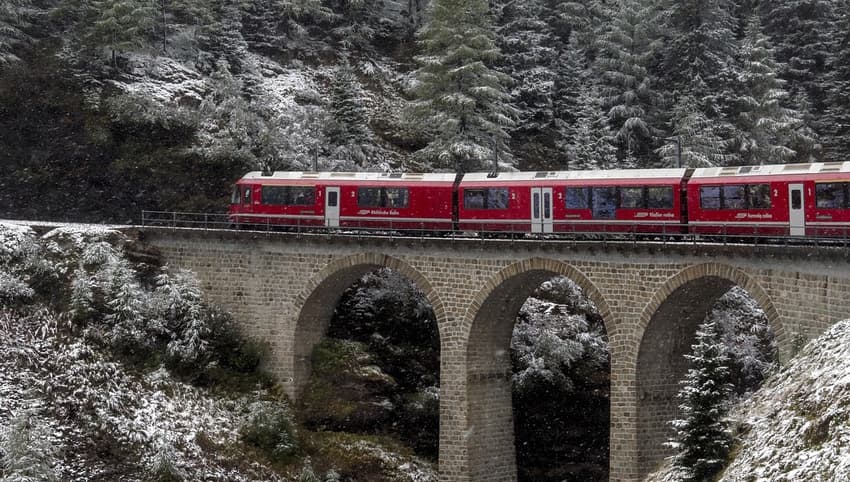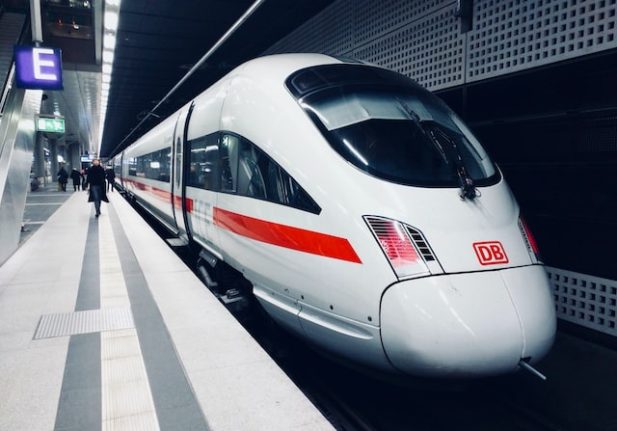REVEALED: The train services in Switzerland most likely to be delayed

Though Switzerland’s trains are known for their reliable punctuality, this reputation may not always be justified, a new study shows. The Swiss like to think that their trains are running as smoothly as their famous watches.
However, it turns out that not all the trains crisscrossing Switzerland’s wide and dense railway network arrive and depart on time.
This is the finding of a major study by CH Media group, which analysed all train traffic over the last year to see how it performed time-wise.
While the largest company, Swiss Federal Railways (SBB), has a punctuality rate of around 92 percent — among the best in Europe — other transport providers don’t always keep up with this standard, the analysis revealed.
The top offender — which probably doesn’t come as a surprise to the Swiss, who consider everything foreign as inferior — is the German rail company Deutsche Bahn (DB).
As a matter of fact, in 2019, an expansion of the DB lines into Switzerland met with some objections because the Swiss were concerned those tardy Germans would mess up their intricate transport system.
And they were right.
As the study shows, DB’s regional RE7 line is most prone to delays.
It leaves Karlsruhe at 2:39 p.m. and is scheduled to arrive at Basel’s Badischer Bahnhof at 5:22 p.m. However, in almost 85 percent of the cases, it was more than 11 minutes late.
While 11 minutes may not seem like much of a delay, it sets off the domino effect of subsequent departures / arrivals being late as well. The RE7 has the worst record, as it appears three times in the top-10 list of punctuality offenders.

DB trains are notoriously late arriving in Switzerland. Photo by Daniel Abadia on Unsplash
In fact, according to the analysis, trains that arrive in Switzerland from abroad have the worst track record — no pun intended.
For instance, the second-worst in terms of delays is SBB’s EC196, which runs from Munich, via Austria, either to St. Margarethen in canton St. Gallen or to Zurich. In 2022, it arrived 12 minutes late more than 84 times out of 100, and 20 minutes late 75 percent of time.
Here too, the Swiss put the blame on their German neighbours.
Though this train is operated by SBB, “the infrastructure in Germany with a long single-track line and train crossings in the Allgäu [a mountainous region in Bavaria] makes operations very demanding," according to company spokesperson Sabrina Schellenberg.
Another line that is on the list of least punctual trains 83.5 percent of the time is Rhaetian Railway’s (RhB) PE955 line, which runs from Chur in Graubünden to Tirano in Italy.
This train, called the Bernina Express (the Express part could be a misnomer here), travels through a spectacular Alpine scenery, so commuters may not even notice they arrive at their destination late.
You can see the entire list of 100 least punctual trains in Switzerland here.
How does the SBB try to avoid chronic delays?
The answer depends on what causes the delays in the first place.
The infrastructure problems in foreign countries (as mentioned above) are obviously beyond SBB’s control.
However, Tobias Imobersteg of the Swiss Railvolution Association said that as it is well known that the trains in Germany are prone to delays, “the Federal Office of Transport should design the timetable accordingly.”
Generally speaking, in order to reduce tardiness, SBB focuses on better distributing its planned construction sites and, subsequently, speed restrictions.
The company is also looking into adapting travel times.
“One of the main reasons [for delays] is that driving and stopping times no longer match reality,” said David Fattebert, head of the SBB's Punctuality Programme (yes, there really is such a position at SBB).
"The timetable must be designed in such a way that there are certain buffers in the rail system", he added.
READ MORE: Why Swiss trains are less punctual — and what is being done about it
Comments
See Also
The Swiss like to think that their trains are running as smoothly as their famous watches.
However, it turns out that not all the trains crisscrossing Switzerland’s wide and dense railway network arrive and depart on time.
This is the finding of a major study by CH Media group, which analysed all train traffic over the last year to see how it performed time-wise.
While the largest company, Swiss Federal Railways (SBB), has a punctuality rate of around 92 percent — among the best in Europe — other transport providers don’t always keep up with this standard, the analysis revealed.
The top offender — which probably doesn’t come as a surprise to the Swiss, who consider everything foreign as inferior — is the German rail company Deutsche Bahn (DB).
As a matter of fact, in 2019, an expansion of the DB lines into Switzerland met with some objections because the Swiss were concerned those tardy Germans would mess up their intricate transport system.
And they were right.
As the study shows, DB’s regional RE7 line is most prone to delays.
It leaves Karlsruhe at 2:39 p.m. and is scheduled to arrive at Basel’s Badischer Bahnhof at 5:22 p.m. However, in almost 85 percent of the cases, it was more than 11 minutes late.
While 11 minutes may not seem like much of a delay, it sets off the domino effect of subsequent departures / arrivals being late as well. The RE7 has the worst record, as it appears three times in the top-10 list of punctuality offenders.

DB trains are notoriously late arriving in Switzerland. Photo by Daniel Abadia on Unsplash
In fact, according to the analysis, trains that arrive in Switzerland from abroad have the worst track record — no pun intended.
For instance, the second-worst in terms of delays is SBB’s EC196, which runs from Munich, via Austria, either to St. Margarethen in canton St. Gallen or to Zurich. In 2022, it arrived 12 minutes late more than 84 times out of 100, and 20 minutes late 75 percent of time.
Here too, the Swiss put the blame on their German neighbours.
Though this train is operated by SBB, “the infrastructure in Germany with a long single-track line and train crossings in the Allgäu [a mountainous region in Bavaria] makes operations very demanding," according to company spokesperson Sabrina Schellenberg.
Another line that is on the list of least punctual trains 83.5 percent of the time is Rhaetian Railway’s (RhB) PE955 line, which runs from Chur in Graubünden to Tirano in Italy.
This train, called the Bernina Express (the Express part could be a misnomer here), travels through a spectacular Alpine scenery, so commuters may not even notice they arrive at their destination late.
You can see the entire list of 100 least punctual trains in Switzerland here.
How does the SBB try to avoid chronic delays?
The answer depends on what causes the delays in the first place.
The infrastructure problems in foreign countries (as mentioned above) are obviously beyond SBB’s control.
However, Tobias Imobersteg of the Swiss Railvolution Association said that as it is well known that the trains in Germany are prone to delays, “the Federal Office of Transport should design the timetable accordingly.”
Generally speaking, in order to reduce tardiness, SBB focuses on better distributing its planned construction sites and, subsequently, speed restrictions.
The company is also looking into adapting travel times.
“One of the main reasons [for delays] is that driving and stopping times no longer match reality,” said David Fattebert, head of the SBB's Punctuality Programme (yes, there really is such a position at SBB).
"The timetable must be designed in such a way that there are certain buffers in the rail system", he added.
READ MORE: Why Swiss trains are less punctual — and what is being done about it
Join the conversation in our comments section below. Share your own views and experience and if you have a question or suggestion for our journalists then email us at [email protected].
Please keep comments civil, constructive and on topic – and make sure to read our terms of use before getting involved.
Please log in here to leave a comment.